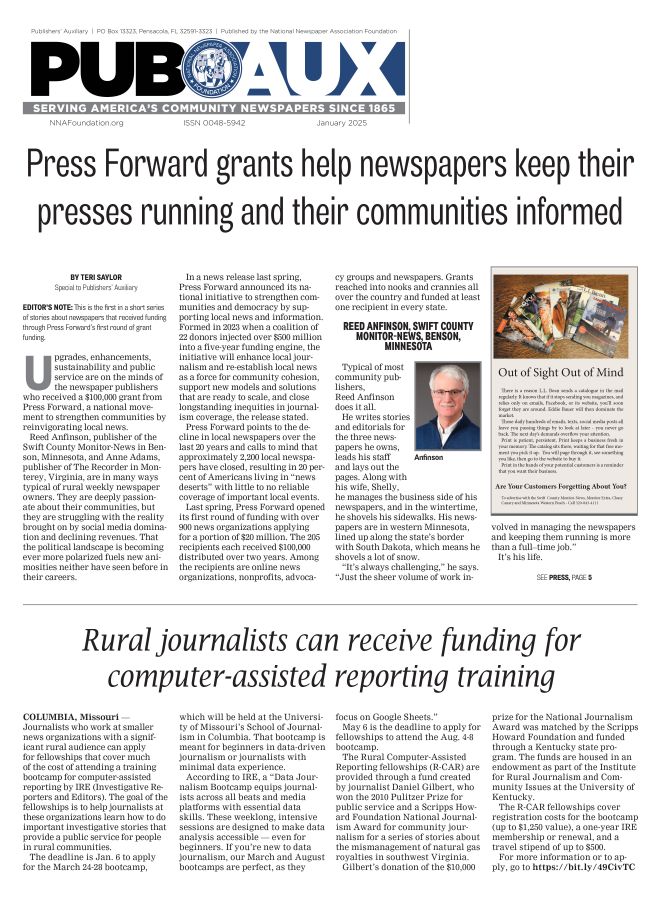Lack of cooperation in legislature hampers progress
May 4, 2018
By Cassandra J. Buchman
NNAF News Fellow | Eastern Illinois University
Although many agree that the political divide between Republicans and Democrats inhibits progress at the state and national level, it’s also the variety of reasons behind this divide that make it a challenge to resolve.
Rep. David Trott, R-MI, said that although everyone talks about the need for bipartisanship, there are a lot of reasons why it doesn’t happen.
“We need to be more tolerant of each other,” he said.
What is needed is forbearance, Trott added.
In a news briefing during the National Newspaper Association’s Community Newspaper Leadership Summit in Washington, March 15, he said, “The party in power can’t use all of its power; they have to forebear and give the other party an opportunity to have a seat at the table (and) be able to have input and solutions,” he said.
With Trott at the briefing in the Capitol Club was Rep. Deborah Dingell, D-MI, who agreed with Trott, saying she tries to make sure that she hears diverse opinions, and that she maintains a friendship with her colleague.
One of the problems in Congress these days is that people do not often develop relationships like this, she said.
“The minute the last vote happens, you race for the airport,” Dingell said. “You don’t just go to dinner with your colleagues. People’s kids used to go to school together; it’s really hard to demonize someone that you know. People don’t get to know each other anymore.”
One issue Dingell pointed to is immigration reform. She noted that many people believe it is needed but differ on how to accomplish it.
“You can have different perspectives. You can respectfully disagree, (and) try to find where that common ground is,” Dingell said.
Trott said some people seem to think compromise is a dirty word.
“The reality is that it’s not what our Constitution contemplated,” he said. “I think we need compromise in the House. I know we need it in the Senate (with the 60-vote rule).”
Trott pointed to the shape of districts because of gerrymandering and the constant need for politicians to raise money as factors leading to them not being able to compromise.
Some have pointed to the influence of lobbyists as a reason for the political divide.
Not every organization in Washington has a particular political agenda, however.
The Friends Committee on National Legislation is a Quaker lobby that tries to advocate peaceful solutions for a variety of issues such as immigration, economic justice, criminal justice and nuclear weapons.
One thing that sets this organization apart from other lobbying entities is that it is nonpartisan.
Diane Randall, FCNL executive secretary, said during a news briefing March 14, that her organization is “broad-based,” focusing on a wide set of issues.
“If we are going to address problems, we need policy change,” Randall said.
As a Quaker organization, one of the FCNL’s core beliefs is that God is in every person. This is something that is crucial to how it engages in advocacy, Randall said.
“(We) listen to what people say,” she said. “Our strength is really in advocacy.”
To Trott, the most compelling reason people are pressured to be so partisan and not compromise is because people “know how (politicians) vote before we walk off the House floor.
“If you aren’t conservative enough, you’ll be primaried, and if you’re not progressive enough, you’ll be primaried on the left,” he said.
Illinois political candidates have seen the problems that stem from a partisan state government, just as they do at a federal level. This partisanship at the state level led to a two-year budget impasse, where Republican and Democratic legislators were unable to compromise and pass a balanced spending plan for the state.
Rep. Shirley Bell, D-IL, the only candidate running in the Democratic primary for state representative in the 110th district, said many people make decisions based on their political affiliation, which hinders progress.
“You’re a Democrat, you’re a Republican, you’re a this or you’re a that, and they vote straight party line so we can’t get anything done,” Bell said. “And this I’m hearing from almost every person I’ve talked to. They are fed up with state government. We need state legislators willing to work across the aisle (and who will) negotiate and focus on problem solving, not partisan positioning. That’s what politics is supposed to be about.”
Terry Davis, a Charleston, IL, jewelry store owner, ran in the Republican primary for state representative, eventually losing to Rep. Chris Miller, R-IL, of Oakland.
It is destabilizing to hear that legislators are not able to solve budgetary problems together, Davis said.
“The years we have been in budget crisis had an effect on the entire community, and businesses felt that (it had) just gotten to the point where they think somebody has to do something,” Davis said. “The state as a whole has suffered tremendously.”
Some of the same battles on issues such as gun control that are happening in Congress are also taking place locally, with different groups unable to reach a consensus on what should be done.
On the same day that a “March for Our Lives” rally was held on Eastern Illinois University’s campus in Charleston, there was a pro-gun rally right across the street.
The people with March for Our Lives held signs advocating for gun reform and stricter gun legislation, the other side held signs supporting the Second Amendment, and they carried American flags.
Supporters at the pro-gun rally expressed concern that more restrictions on guns would lead to a ban on all guns.
“They’ll just turn around and say that ‘we need to take away semi-automatic guns from everybody because they’re dangerous,’” Bill Harrison, the regional director for Guns Save Life, said.
Those at the March for Our Lives rally talked about their own experiences with gun violence and advocated for keeping “guns out of the wrong hands.”
Charleston City Council member Dennis Malak said the March for Our Lives movement has already helped push for laws in other states and started bills across the country, but they need to keep pushing.
“These are all great first steps, but the fight is not over,” Malak said. “We need common sense, nationwide gun laws that keep our communities safe.”
The vitriol in Washington, with those on both party lines attacking one other, has not escaped the notice of those living in Coles County. Zoey White, a local high school student, and her mother, Jennifer White, regularly attend marches and rallies, including the “March for Our Lives.”
Zoey White said she has been targeted at school for speaking out about gun violence and going to the women’s march.
“People have harassed me and called me out in class,” she said.
Jennifer White said in this area, they are “kind of outnumbered” when it comes to their political views.
This, however, does not stop White from standing up for her beliefs.
“How else are we going to get our voice out there and make a change?” she said.







